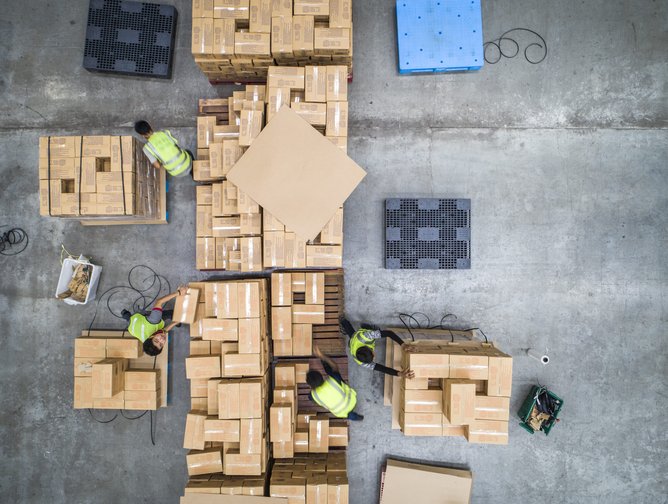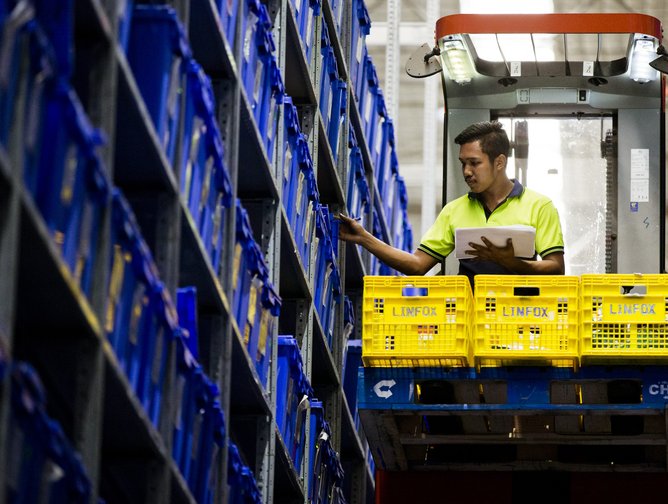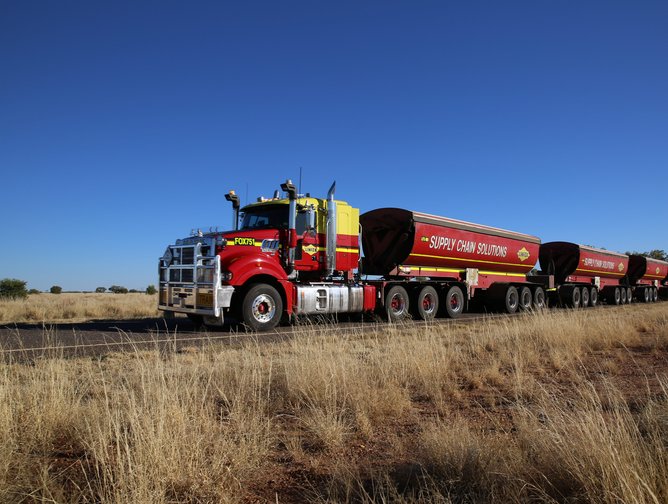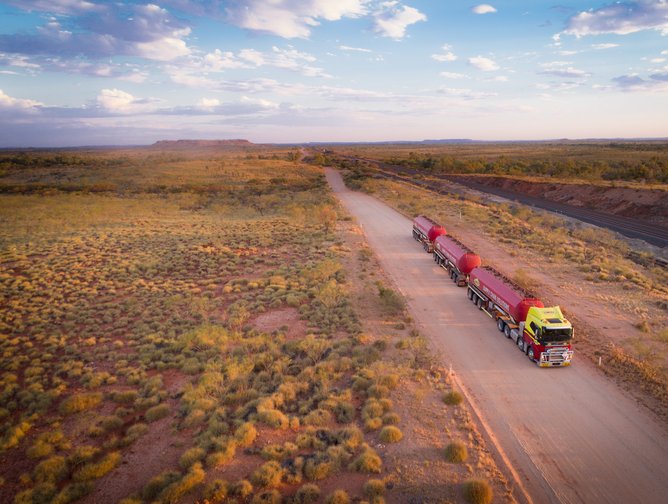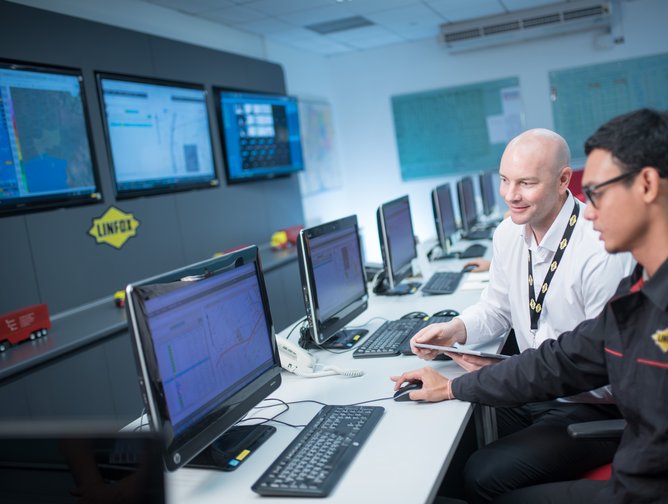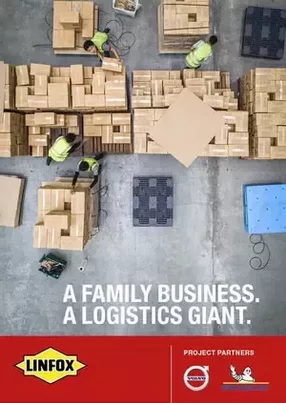How strong leadership has established Linfox as a logistics giant
In 1956 Lindsay Fox founded Linfox with just one truck in Melbourne, Australia.
Fast forward to today and the company is regarded as a logistics giant, standing as the largest privately-owned logistics company in the Asia Pacific.
Still owned by the iconic Australian family, Linfox’s footprint now stretches across the Asia-Pacific, with more than half of its growing team situated in Asia.
Even with this acclaim, however, Linfox hasn’t forgotten its roots and remains now, more than ever, a company built on family values and compelling leadership.
Andrew Johnstone, Operations Director at Linfox Thailand, says that, even as the company’s presence expands, Linfox’s foundation is one that will remain focused on those same meaningful family values that were instilled in the company from the beginning.
“Whilst working at both Linfox Australia and Linfox Thailand, I’ve really seen the depth and breadth of how Linfox does business,” observes Johnstone. “The value that we have in our people and our leadership has allowed us to channel our vision from Australia through to Asia.
“There are cultural differences, absolutely, but the fundamentals of doing business from a leadership perspective are very much the same,” he continues. “It’s about investing in great leaders, investing in partnerships, and bringing our vision to life to connect with our customers.
“Fundamentally, I think one of our key differentiators is that we are a large business that operates with family values. We care about our people and customers like they're our own family. Lindsay’s original vision of taking care of our people, our customers and building relationships, from back in 1956, still carries on in the business today and it's stronger now than ever before. For me, that’s the key to the company’s success.”
First joining Linfox in 2008, Johnstone understands the importance of strong leadership first-hand. Responsible for managing large-scale operations, warehouse management, supplier relations and more, he says that Linfox recognised early on that it needs great leaders to connect and inspire its large, diverse workforce.
“As a non-Thai speaking leader in this country, I utilise all my skills and past knowledge to navigate cultural differences,” he explains. “When it comes to leadership it comes back to the fundamentals of focusing on the company’s vision and managing change through effective communication.
“Pace of change is much quicker here in Asia and Thailand particularly,” he adds. “Although there may be differences, there are also lots of similarities – I think it’s important to understand that wherever you go people are universal and the way we need to lead comes back to people first.”
For great leaders to succeed they also need a clear strategic plan to follow and it seems that Linfox has developed a sure-fire vision for growth.
Clear to grow its footprint, the firm has continued to make significant capital investments throughout Australia and the Asia-Pacific region.
In doing so, it seems the logistics giant has a meticulous plan for expansion and sustainable growth.
“This investment demonstrates to both the country (Thailand) and our customers that we’re serious about doing business here, not just in the next two or three years, but long into the future,” Johnstone explains. “Part of our long-term strategy for growth also involves attracting new business and investing across the Asia Pacific region.”
With compelling leadership at the helm of the company, this is not only transforming the firm internally, but also having a tangible impact on the customer experience.
“From my perspective, when I talk about the family values, it’s about people, it’s about relationships,” notes Johnstone. “People are our number one asset. If we can invest in our team and give them the opportunity to grow and develop, we believe that they'll be thoroughly engaged and care for our customers’ needs on an authentic and genuine level.
“The way you engage employees is by having great leaders,” he continues. “Every time we talk to an employee – a driver, a cleaner, a shift manager – it's an opportunity to engage with them in a genuine, authentic way.”
Personally responsible for a team of around 2,500 people, Johnstone says that the firm consistently invests in the upskilling and training of the team to create a workforce that is adaptable, agile and skilled.
“Today, we're investing in developing our leaders’ cross-functional capabilities so that they have transferable skills and can move from one role to another,” he explains. “This is because we don't want to employ someone to just fill a vacant position, we are always thinking two or three positions ahead so that the employee has the opportunity to grow and develop. We want to build capability within our brand and become an employer of choice.
“I believe we should hire for attitude and train for skill because bringing in the right people with the right attitude, the right mindset, and the right behaviour is key to success. My approach involves taking managers and developing them into leaders.”
By creating a highly-skilled, driven workforce, this is also influencing the way that Linfox approaches key challenges such as health and safety.
Safety is a top priority at Linfox and, as such, the logistics firm has created a dedicated Vision ZERO safety programme whereby it aims to achieve zero fatalities, injuries, motor vehicle incidents, net environmental emissions and also pledges zero tolerance of unsafe behaviour and practices.
Since launching the programme, Linfox has reduced its Lost Time Injury Frequency Rate (LTIFR) by more than 90%. In Thailand, Johnstone says that whilst instilling a culture of safety and compliance has been a challenge at times, it was an important task because when it comes to safety, one injury is one too many.
“Thailand frequently tops the rankings as the country with the highest amounts of traffic incident rate in the world. Therefore, for us to see a year-on-year reduction in the number of incidents has been something that I'm extremely proud of,” Johnstone says.
“My hope is that all of our people will do the right thing when no one's watching,” he adds. “I want to ingrain the values and the principles of the organisation in our team so they truly understand the responsibility that they have to act safely, not only for Linfox but for themselves and their families.
“In Asia, we have programmes to consistently improve the culture of safety and compliance as we don't want our team to make decisions at any cost or put themselves in harm’s way to get a job done, so we’re educating our people – we have an extremely robust fatigue management policy, and we monitor our vehicles and driver hours. On top of this, we’re also partnering with our customers and the local authorities to ensure that we've got the best safety practices in place.”
As well as promoting the highest safety practices, Linfox is also tapping into some of the industry’s most cutting-edge technologies to protect its people and support its customer relationships.
By using state-of-the-art innovations such as driver monitoring, facial recognition, and fleet care, Linfox is making sure that its team operate in a safe and responsible manner.
“We monitor our vehicles to ensure safety and we proudly partner with Michelin in Thailand. Their fleet care programme is fully digitized and their monthly tyre inspections ensure our team are in safe, efficient vehicles.
“We also have a 24/7 monitoring capability which checks our drivers’ safety, performance, and efficiency,” explains Johnstone. “With this, we've been able to reduce incidents involving distractions and fatigue which are some of the biggest causes of road incidents in Asia. This investment has been made because we genuinely care about our people. For me, if we save one life it’s been successful.”
Keen to tackle the pressing issue of sustainability and CO2 emissions, Linfox has also explored the use of electric vehicles, partnering with automotive behemoth Volvo.
“We’re fortunate to have long standing partners in Michelin and Volvo who are aligned with our values and place the same level of importance on safety, efficiency and innovation.”
Although challenges such as congested areas and unpredictable geography remain, the firm says it is striving to become more environmentally-aware.
“We're constantly researching and working on alternate fuel source vehicles and automation,” notes Johnstone.
“In Asia, the region is increasingly looking for alternative fuel vehicle solutions particularly due to environmental issues such as air quality and pollution. At Linfox, we’ve partnered closely with Volvo, who are on the cutting edge for safety and innovation in electric heavy vehicle production. Anything we can do to reduce our emissions is absolutely being evaluated.”
Whilst Linfox may have invested in state-of-the-art technologies and implemented the very latest safety practices, the fundamentals of Lindsay’s original vision still ring true today.
Looking to the future, Johnstone says that he is optimistic about the road ahead.
“I would say that in the next five or 10 years, our relationship with our customers is going to be closer and more developed than ever and we will also attract new business because of our strong ethos, family values, and commitment to innovation,” he says. “Our safety record speaks for itself and our leaders are doing a phenomenal job in driving change and leading our people in the right direction.
“I get really passionate when I talk about leadership and our team because I genuinely believe that that's what the business about,” he adds. “We can have all the technology in the world but it doesn't mean a lot unless we have passionate leaders who share and integrate our vision to ensure that technology is used correctly. Today, if you want to send products and goods you need to rely on transport systems and logistics, and these systems still, and will likely always, rely on people. I believe if we get the people right, we're on the road to success.”
